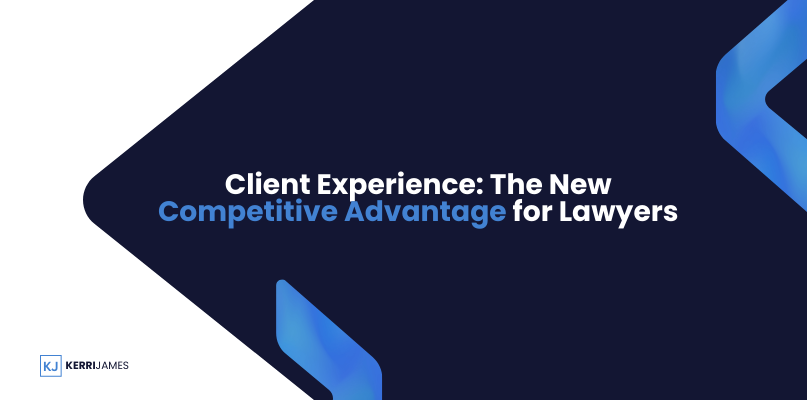The legal industry is in the midst of a profound transformation. Gone are the days when a lawyer’s expertise and track record were the sole determinants of success. Today, clients demand more—they expect an experience that is not only professional but also deeply personal and responsive to their needs. In an age where client reviews can make or break a business, law firms must recognize that client experience is not just a buzzword; it’s a critical component of their competitive strategy.
Imagine a potential client browsing through law firms online. They come across two firms with similar expertise and success rates. However, one firm has a slew of glowing reviews about their attentive service, timely communication, and supportive approach, while the other has a few complaints about unreturned calls and impersonal service. Which firm do you think they will choose? The answer is clear. The firm that prioritizes client experience wins—every time.
This shift towards prioritizing client experience represents a seismic change in the way law firms must operate to stay competitive. It’s no longer just about what you do, but how you make your clients feel throughout their journey with your firm. In this blog post, we’ll explore why client experience has become the new competitive advantage for lawyers, what it entails, and how your firm can enhance it to not only meet but exceed client expectations.
1. The Shifting Landscape of Legal Services
The legal industry has long been governed by traditional factors such as expertise, reputation, and the ability to win cases. However, these elements are no longer the sole drivers of competition. The legal market has become increasingly commoditized, with clients having more choices and access to information than ever before. This democratization of legal services has shifted the focus from merely offering legal solutions to delivering a superior client experience.
The Commoditization of Legal Services
The rise of technology and alternative legal service providers has made legal expertise more accessible. Online platforms offer everything from contract templates to legal advice, often at a fraction of the cost of traditional law firms. While these services may not replace the need for personalized legal counsel, they have certainly raised the bar for what clients expect from their lawyers.
As a result, law firms must differentiate themselves in new ways. Expertise alone is no longer enough. Clients are looking for a seamless, supportive experience that makes them feel valued and understood. This is where client experience becomes a key differentiator.
Client-Centered Practices
In response to these changes, many law firms are adopting a client-centered approach. This means putting the client’s needs and expectations at the forefront of every decision. Whether it’s the way you communicate, the technology you use, or the processes you implement, every aspect of your firm should be designed to enhance the client experience.
For example, some firms have implemented client portals that allow clients to track the progress of their case, access documents, and communicate with their lawyer at any time. Others have invested in training programs that teach lawyers and staff how to communicate more effectively and empathetically with clients. These initiatives reflect a broader shift towards prioritizing the client’s overall experience, not just the legal outcome.
2. What is Client Experience in the Legal Context?
Client experience in the legal context is the cumulative perception a client has of your firm based on every interaction they have with you. It encompasses all aspects of their journey, from the moment they first contact your firm to the final resolution of their case. It’s about how clients feel about your firm, not just what they think about the legal service you provide.
Defining Client Experience
Client experience is holistic. It’s not just about delivering a favorable legal outcome; it’s about the entire process leading up to that outcome. Did the client feel heard and understood? Were they kept informed at every stage? Did they feel respected and valued? These are the questions that define the quality of a client’s experience with your firm.
To truly understand client experience, it’s important to recognize that it’s shaped by both tangible and intangible factors. Tangible factors include things like the efficiency of your processes, the clarity of your communication, and the accessibility of your services. Intangible factors are more about the emotional responses your clients have—how they feel about their interactions with you, whether they feel supported and reassured, and if they believe you genuinely care about their case.
Components of a Strong Client Experience
- Communication: At the heart of a strong client experience is effective communication. Clients want to be kept in the loop, especially in legal matters that are often complex and stressful. Regular updates, clear explanations of legal processes, and prompt responses to inquiries are all essential. Remember, even when there’s no significant update, a simple message to reassure the client that their case is progressing can make a huge difference.
- Accessibility: Accessibility means more than just being available during business hours. It’s about providing multiple channels of communication (phone, email, client portals) and being responsive to client needs, even outside traditional working hours. In today’s digital age, clients expect instant access to information and the ability to communicate with their lawyer when it’s convenient for them.
- Empathy: Legal issues are often accompanied by stress, anxiety, and uncertainty. Showing empathy means acknowledging these emotions and providing reassurance. It’s about listening actively, validating the client’s feelings, and offering comfort through your words and actions. Empathy builds trust and strengthens the client-lawyer relationship.
- Efficiency: Clients appreciate when their cases are handled efficiently. This doesn’t mean rushing through legal work, but rather, managing time effectively and avoiding unnecessary delays. Efficient processes show that you respect your client’s time and resources, and they help build a positive experience.
- Personalization: Every client is unique, and a one-size-fits-all approach rarely works in legal services. Personalizing your approach to each client’s needs, preferences, and circumstances can greatly enhance their experience. This might involve customizing communication styles, addressing specific concerns proactively, or offering additional support where needed.
Analogies and Examples
Think of client experience like customer service in any other industry. Imagine dining at a restaurant where the food is excellent, but the service is slow, the waitstaff is inattentive, and your concerns are dismissed. No matter how good the food is, the poor service would leave a bad taste in your mouth. The same applies to legal services. A client may receive a favorable legal outcome, but if their experience was marked by poor communication, long delays, and a lack of empathy, they’re unlikely to return or recommend your firm to others.
3. The Business Case for Prioritizing Client Experience
Investing in client experience is not just about making clients happy—it’s a smart business move that can lead to increased profitability, client retention, and referrals. Let’s explore the business case for making client experience a top priority in your firm.
The Impact on Client Retention and Referrals
Satisfied clients are more likely to return to your firm for future legal needs and to refer others to your services. In fact, according to a study by the American Bar Association, 70% of clients who had a positive experience with their lawyer said they would refer them to others. On the other hand, clients who had a negative experience, even if the legal outcome was favorable, were less likely to return or recommend the firm.
Client experience also plays a critical role in online reviews, which have become a major factor in the decision-making process for potential clients. A report by BrightLocal found that 86% of consumers read reviews for local businesses, including law firms, before making a decision. Positive reviews can significantly boost your firm’s visibility and credibility, while negative reviews can deter potential clients.
The Financial Benefits of Investing in Client Experience
Enhancing client experience doesn’t just lead to higher client satisfaction; it can also improve your firm’s bottom line. Research shows that companies that prioritize customer experience outperform their competitors by 80% in terms of revenue growth. For law firms, this means that investing in client experience can lead to higher client retention rates, more referrals, and ultimately, greater profitability.
Consider the example of a law firm that implemented a comprehensive client experience strategy, including regular communication, a user-friendly client portal, and a commitment to personalized service. Within a year, the firm saw a 30% increase in client retention and a 50% increase in referrals. These improvements translated into a significant increase in revenue, far outweighing the costs of the client experience initiatives.
Case Studies and Relatable Examples
One notable example is a boutique law firm that focused on improving client experience by investing in technology and training. They introduced a client portal that provided clients with real-time access to their case files, scheduled updates, and direct communication with their lawyer. The firm also implemented a training program to enhance communication skills across the team. The result? A 40% increase in positive client feedback, a significant reduction in client complaints, and a 20% increase in new client referrals—all within the first year.
This example illustrates how a focus on client experience can lead to tangible business outcomes. By investing in the right tools and training, and by making client experience a priority, law firms can create a sustainable competitive advantage that drives growth and profitability.
4. How to Enhance Client Experience in Your Law Firm
Improving client experience is a multifaceted endeavor that requires a strategic approach. It’s about more than just making surface-level changes; it involves rethinking how your firm operates and interacts with clients at every level.
Training and Development
The first step in enhancing client experience is to ensure that everyone in your firm, from partners to administrative staff, understands its importance and knows how to deliver it. This requires comprehensive training and ongoing development.
Start by training your staff on the basics of client experience, including effective communication, active listening, and empathy. These skills are critical in building strong client relationships. Regular training sessions can help reinforce these skills and keep everyone aligned with the firm’s client experience goals.
In addition to general training, consider specialized training for different roles within your firm. For example, your reception staff should be trained in customer service and managing client inquiries, while your lawyers should receive training in client communication and case management. By tailoring training to specific roles, you can ensure that every interaction a client has with your firm is positive and professional.
Technology and Tools
Technology plays a crucial role in enhancing client experience. The right tools can streamline communication, improve accessibility, and make it easier for clients to interact with your firm.
One of the most effective tools for enhancing client experience is a client portal. A client portal allows clients to access their case information, communicate with their lawyer, and receive updates in real-time. This not only improves transparency but also reduces the need for clients to contact your firm for updates, freeing up your staff to focus on more complex tasks.
CRM (Customer Relationship Management) systems are another valuable tool. CRM systems help manage client interactions, track communication history, and ensure that no client is overlooked. This can lead to more personalized and consistent client interactions, which are key components of a positive client experience.
In addition to client portals and CRM systems, consider investing in other technologies that can enhance client experience, such as secure messaging platforms, online appointment scheduling, and virtual consultation tools. These technologies can make it easier for clients to connect with your firm and manage their cases, leading to higher satisfaction and loyalty.
Client Feedback
Client feedback is a powerful tool for improving client experience. By regularly gathering feedback from your clients, you can identify areas where your firm is excelling and areas where there’s room for improvement.
There are several ways to gather client feedback, including surveys, interviews, and feedback forms. When designing your feedback process, make sure to ask specific questions that will provide actionable insights. For example, instead of simply asking, “How satisfied are you with our service?” you might ask, “How would you rate our communication during your case?” or “What could we have done better to meet your needs?”
Once you’ve gathered feedback, it’s important to act on it. Use the insights you gain to make targeted improvements to your client experience. This could involve addressing specific pain points, such as slow response times or unclear communication, or making broader changes to your processes or services.
Client Journey Mapping
A client journey map is a visual representation of the steps a client takes when interacting with your firm, from the initial consultation to the resolution of their case. By mapping out the client journey, you can identify key touchpoints where the client experience can be improved.
To create a client journey map, start by outlining the major stages of the client’s journey, such as initial contact, consultation, case management, and case resolution. Then, break down each stage into specific touchpoints, such as phone calls, emails, meetings, and document exchanges. For each touchpoint, consider the client’s needs and expectations, and identify any pain points or areas where the experience could be enhanced.
For example, if you find that clients often feel anxious during the case management stage due to a lack of updates, you might implement a system for providing regular updates through a client portal or automated emails. Or, if clients often have questions during the consultation stage, you might create a FAQ section on your website or offer a free initial consultation to address their concerns.
By mapping out the client journey and making targeted improvements, you can create a more seamless and satisfying experience for your clients.
Cultural Shift and Consistent Communication
Enhancing client experience requires a cultural shift within your firm. This means creating a client-centric culture where every team member understands the importance of client experience and is committed to delivering it.
One way to foster this cultural shift is by embedding client experience into your firm’s values and mission statement. Make it clear that client experience is a top priority, and recognize and reward team members who go above and beyond to deliver exceptional service.
Consistent communication is also key to a positive client experience. Develop a communication plan that ensures clients are regularly updated on their case’s progress, and make sure that all communication is clear, concise, and professional. Even if there’s no significant news, a brief update can help reassure clients that their case is being actively managed.
5. Overcoming Common Challenges
While the benefits of enhancing client experience are clear, implementing changes can be challenging. Let’s explore some of the common obstacles law firms face when trying to improve client experience, and how to overcome them.
Resistance to Change
One of the biggest challenges is overcoming resistance to change within the firm. Lawyers and staff may be accustomed to doing things a certain way and may be reluctant to adopt new practices focused on client experience.
To overcome resistance to change, it’s important to communicate the benefits of improving client experience clearly. Highlight how these changes can lead to better client retention, increased referrals, and ultimately, greater profitability. Involve key stakeholders in the planning process and seek their input on how to implement changes effectively.
It’s also helpful to start with small, manageable changes that can demonstrate the benefits of a client-centric approach. For example, you might begin by improving communication practices or introducing a new client portal. Once the team sees the positive impact of these changes, they may be more open to adopting broader client experience initiatives.
Cost Considerations
Enhancing client experience often requires an investment in technology, training, and possibly additional staff. Law firms need to weigh these costs against the potential return on investment.
To address cost considerations, start by prioritizing the changes that will have the greatest impact on client experience. Focus on high-value initiatives, such as improving communication or implementing a client portal, that can quickly demonstrate a return on investment. Consider starting with a pilot program that focuses on improving client experience in a specific practice area or with a particular group of clients. This allows the firm to test new strategies on a smaller scale before rolling them out firm-wide.
Incorporate client experience enhancements into your firm’s annual budget planning. By allocating funds specifically for this purpose, you can ensure that these initiatives are prioritized and resourced appropriately.
6. The Future of Client Experience in the Legal Industry
As technology advances and client expectations continue to rise, the importance of client experience in the legal industry will only grow. Firms that stay ahead of the curve by embracing new trends and continuously improving their client experience will be best positioned for long-term success.
Emerging Trends
Several emerging trends are likely to influence client experience in the future. One of the most significant is the rise of artificial intelligence (AI) and automation in legal services. AI-powered tools can provide instant answers to client inquiries, automate routine tasks, and even predict legal outcomes based on historical data. By leveraging AI and automation, law firms can enhance efficiency and provide a more responsive client experience.
Another trend is the increasing demand for remote consultations. The COVID-19 pandemic accelerated the adoption of remote work and virtual meetings, and many clients now prefer the convenience of virtual consultations. Law firms that offer flexible, remote services can attract a broader client base and offer greater flexibility in their services.
Finally, clients’ expectations for transparency and communication are likely to continue rising. Clients want real-time access to information and expect regular updates on their cases. Firms that can meet these expectations through technology and consistent communication will have a competitive edge.
Forward-Looking Statements
To stay competitive, law firms must view client experience as an ongoing priority, not a one-time project. This means continuously seeking out new ways to enhance the client experience, whether through technology, process improvements, or cultural shifts within the firm. By doing so, your firm can build stronger client relationships, increase client loyalty, and achieve sustainable growth.
The future of client experience in the legal industry is bright, but it requires a proactive approach. Law firms that embrace innovation, prioritize client needs, and invest in the right tools and training will be well-positioned to thrive in this new landscape.
Final Words
In today’s rapidly evolving legal landscape, client experience has emerged as the new competitive advantage for law firms. It’s no longer enough to rely solely on legal expertise and reputation; clients are looking for a more holistic experience that makes them feel valued, informed, and supported throughout their legal journey. By prioritizing client experience, your firm can differentiate itself from the competition, attract and retain clients, and build a reputation for excellence.
The time to act is now. Evaluate your current client experience strategies, identify areas for improvement, and start making the necessary changes to position your firm for long-term success. Remember, in the eyes of your clients, the experience you provide can be just as important as the legal outcomes you achieve.










